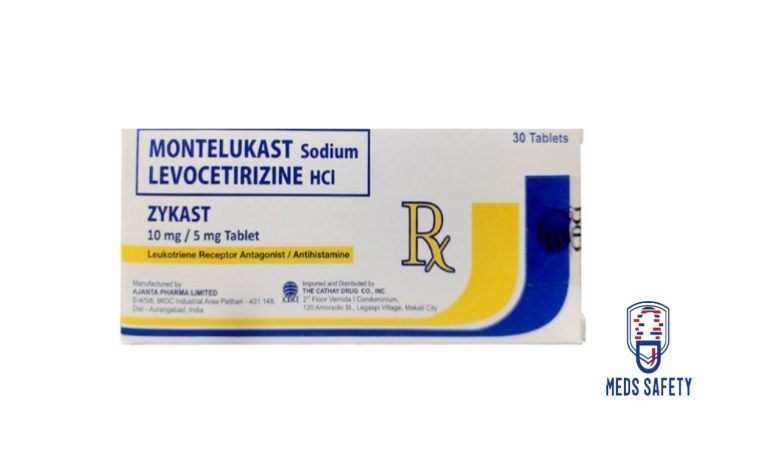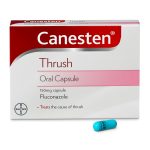Zykast: Uses, Benefits, Dosage, Side Effects, FAQs

What is Zykast used for?
Zykast is a combination medication that contains two active ingredients: levocetirizine hydrochloride (5 mg) and montelukast sodium (10 mg). Zykast is primarily used for the relief of symptoms associated with seasonal and perennial allergic rhinitis, which includes symptoms such as sneezing, itching, runny nose, and nasal congestion.
Zykast combines two active ingredients, Montelukast and Levocetirizine, to provide relief from these allergic rhinitis symptoms. Montelukast is a leukotriene receptor antagonist that helps reduce inflammation in the airways and alleviate nasal congestion. Levocetirizine is an antihistamine that blocks the action of histamine, a chemical produced by the body in response to allergens, to reduce itching, sneezing, and runny nose.
It’s important to note that while Zykast is primarily indicated for allergic rhinitis, it may also be used in some cases for the relief of symptoms associated with asthma. However, the use of Zykast for asthma management should be determined by a healthcare professional based on individual patient needs and considerations.
Zykast is a popular medication in the Philippines where it is mostly available over the counter. Many online stores also sell Zykast over the counter as the medication does not need a prescription. Zykast is manufactured by Ajanta Pharma Limited an Indian pharmaceutical company.
Benefits of Zykast
Zykast has several benefits some of which include:
1. Allergy Relief: Levocetirizine is an antihistamine that helps relieve symptoms associated with allergies such as sneezing, itching, runny nose, and watery eyes. It works by blocking the action of histamine, a substance produced by the body in response to allergens.
2. Asthma Management: Montelukast is a leukotriene receptor antagonist that is commonly used in the management of asthma. It helps prevent the tightening of airway muscles, reduces inflammation in the airways, and decreases the production of mucus. By doing so, it can help improve asthma symptoms and reduce the frequency of asthma attacks.
3. Combined Effect: The combination of Montelukast and Levocetirizine in Zykast provides a dual-action approach to address both the underlying inflammation and the symptoms associated with allergies and asthma. This combination can offer more comprehensive relief compared to using each medication alone.
4. Convenience: Zykast combines two active ingredients into a single tablet, which can be more convenient for individuals who require both Montelukast and Levocetirizine. Taking one tablet instead of multiple medications can simplify the medication regimen and improve adherence.
5. Once-Daily Dosage: Zykast is typically taken once daily, which can enhance compliance and make it easier to incorporate into a daily routine. Remember to follow the dosage instructions provided by your healthcare provider or the instructions on the packaging.
Zykast Dosage
For adults, the recommended dosage of Zykast is one tablet daily. Each tablet contains 10 mg of Montelukast and 5 mg of Levocetirizine. It is generally taken once a day, preferably at the same time each day. However, it is important to follow the specific instructions provided by your physician or as indicated on the prescription label.
For children aged 15 and above, the recommended dosage of Zykast is one tablet daily. It should be taken once a day, preferably at the same time each day. However, it is important to follow the specific instructions provided by the physician or as indicated on the prescription label.
It is worth noting that the administration of Levocetirizine to infants and toddlers aged less than 2 years is not recommended. Therefore, the use of Zykast (Montelukast plus Levocetirizine) is not recommended for infants and toddlers under the age of 2 years. This is due to factors such as safety considerations and the lack of sufficient clinical data for this age group.
Elderly patients should have their dosage adjusted based on their renal function. This means that the dosage may need to be modified depending on how well their kidneys are functioning. It is advised to consult with a healthcare professional to determine the appropriate dosage for elderly patients with renal impairment.
It is crucial to adhere to the prescribed dosage and follow the instructions provided by your healthcare provider. Do not exceed the recommended dosage unless specifically instructed to do so. If you miss a dose, take it as soon as you remember. However, if it is close to the time for your next scheduled dose, skip the missed dose and continue with your regular dosing schedule.
It is important to note that Zykast should only be taken as directed by a healthcare professional and under their supervision. If you have any questions or concerns about the dosage or administration of Zykast, it is recommended to consult with your physician or pharmacist for further guidance.

How long can I take Zykast?
The duration of treatment with Zykast should be determined by your healthcare provider. The length of time you can take Zykast may vary depending on the specific condition being treated, the severity of your symptoms, and your individual response to the medication.
In some cases, Zykast may be prescribed for short-term use to provide relief from acute allergic rhinitis symptoms. This could be for a few days or weeks during allergy seasons or in response to specific triggers.
For individuals with chronic allergic rhinitis or other conditions where long-term management is required, Zykast may be used as a maintenance treatment. In such cases, your healthcare provider will assess the benefits and potential risks of long-term use and determine the appropriate duration of treatment.
It is important to follow your healthcare provider’s instructions regarding the duration of Zykast treatment. Do not stop or change the duration of use without consulting your healthcare provider, as abruptly discontinuing the medication or prolonging its use without medical guidance may have adverse effects.
Regular follow-up appointments with your healthcare provider are essential to monitor your condition and evaluate the effectiveness and safety of Zykast. They can provide guidance on the duration of treatment that is suitable for your specific situation.
Is Zykast Safe for Breastfeeding and Pregnancy?
The safety of using Zykast during pregnancy has not been well established through controlled clinical trials. Due to the limited data available, it is not recommended to use Zykast in women who are pregnant. It is important to consult with a healthcare provider to discuss the potential risks and benefits, as well as explore alternative treatment options if needed.
Regarding breastfeeding, there is currently insufficient information available regarding the amount of Montelukast and Levocetirizine excreted into breast milk and what effects they may have on the nursing infant. Therefore, the use of Zykast is not recommended for breastfeeding women. It is recommended to consult with a healthcare provider for guidance on alternative treatment options that are considered safe during breastfeeding.
It is crucial to prioritize the health and safety of both the mother and the infant. Consulting with a healthcare provider can help weigh the potential risks and benefits of using Zykast during pregnancy or while breastfeeding and determine the most appropriate course of action.
Zykast Side Effects
Zykast may cause certain side effects. It’s important to note that not all individuals will experience these side effects, and their severity can vary. Common side effects include:
- Headache
- Fatigue
- Dizziness
- Somnolence (feeling drowsy or sleepy)
- Dry mouth
- Abdominal pain
- Dyspepsia (indigestion)
- Nausea
- Diarrhea
- Nasal congestion
- Cough
- Rash
- Increased liver enzyme levels (ALT and AST)
These side effects are typically mild to moderate in severity and may resolve on their own without medical intervention. However, if you experience persistent or severe side effects, it’s important to consult your healthcare provider.
It’s worth noting that some individuals may experience rare or more serious side effects that are not listed above. If you notice any unusual or severe symptoms while taking Zykast, it’s important to seek immediate medical attention.
What drugs can interact with Zykast?
Zykast can potentially interact with other medications. It’s important to consult with a healthcare professional or pharmacist to discuss specific drug interactions based on your individual medical history and current medications. Here are some examples of medications that may interact with Zykast:
1. Other Antihistamines: Taking Zykast with other antihistamine medications can increase the risk of side effects such as drowsiness, dizziness, and difficulty concentrating. It’s generally not recommended to take multiple antihistamines together without medical supervision.
2. Sedatives or CNS Depressants: Zykast may enhance the sedative effects of other medications that act on the central nervous system (CNS), such as tranquilizers, sleep aids, or certain pain medications. Combining these drugs can lead to increased drowsiness and impaired coordination.
3. Phenytoin or Phenobarbital: These medications, which are used to treat seizures, may reduce the effectiveness of Montelukast. If you’re taking Zykast and need to start or stop these seizure medications, your healthcare provider may need to adjust your dosage.
4. Rifampin: Rifampin, an antibiotic used to treat tuberculosis and other infections, may reduce the levels of Montelukast in the body. Your healthcare provider may need to monitor your response to Zykast or adjust your dosage if you’re taking rifampin.
5. Warfarin: Montelukast has the potential to increase the effects of warfarin, an anticoagulant (blood thinner). If you’re taking warfarin and are prescribed Zykast, your healthcare provider may monitor your blood clotting factors more closely.
6. Other Asthma Medications: If you’re taking other medications for asthma management, such as inhaled corticosteroids or bronchodilators, it’s important to discuss their use with your healthcare provider. They can provide guidance on how to best incorporate Zykast into your asthma treatment plan.
These are not exhaustive lists, and there may be other medications that can interact with Zykast. It’s crucial to disclose all your current medications, including prescription drugs, over-the-counter medications, and supplements, to your healthcare provider or pharmacist to ensure the safe and effective use of Zykast. They can assess any potential interactions and provide appropriate recommendations based on your specific situation.





